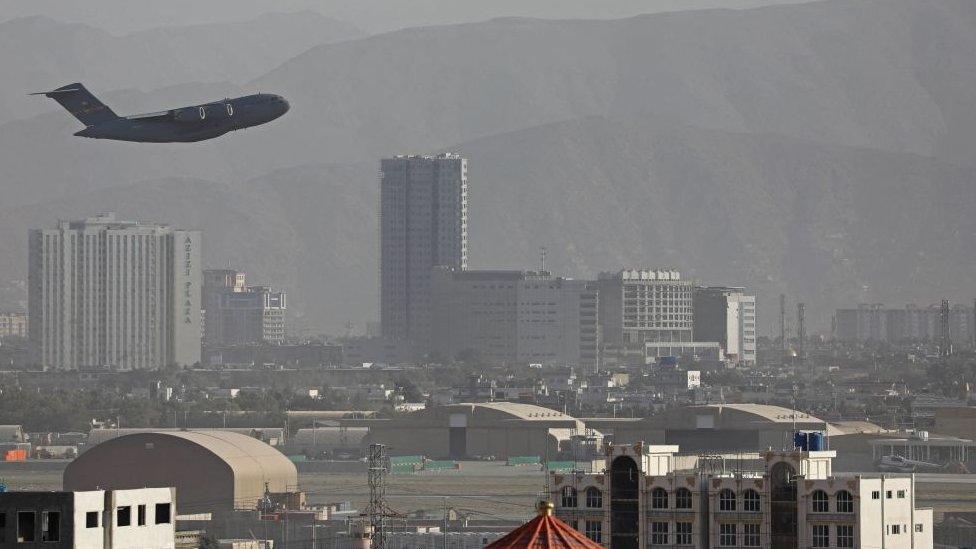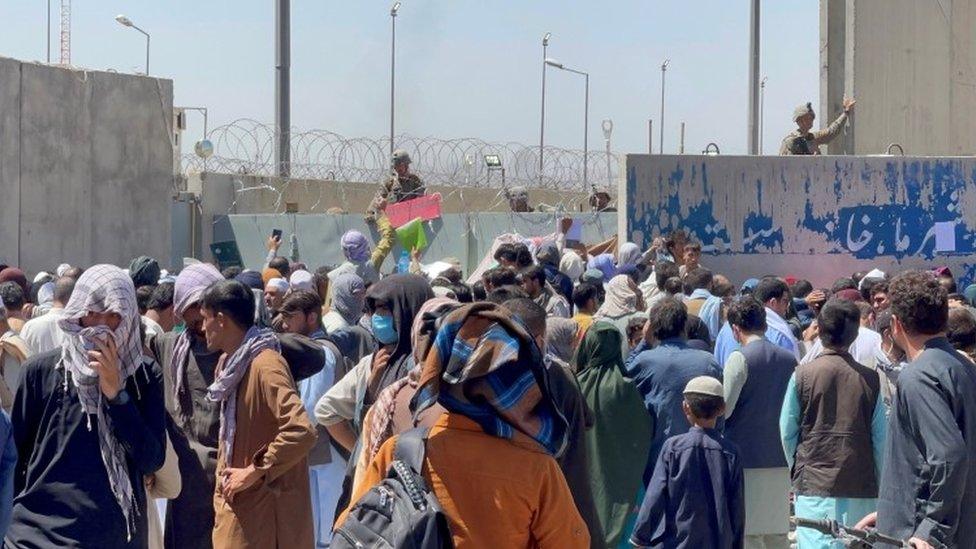Afghanistan: Boris Johnson vows to help those left behind
- Published
Boris Johnson: "If Taliban want engagement then safe passage is absolutely paramount."
Boris Johnson says he will "shift heaven and earth" to help people leave Kabul after 31 August, as evacuations by the UK enter the final stages.
The prime minister said he felt a "great sense of regret" about those left behind in Afghanistan.
No more people are being called to the airport to leave, with the Ministry of Defence saying it had closed processing facilities in Kabul.
American troops will withdraw by the end of the month.
The US has been running the airport in Afghanistan's capital, where at least 95 people - including two British nationals and the child of a British national - were killed in a suicide bomb attack on Thursday.
Mr Johnson said: "Of course, as we come down to the final hours of the operation there will sadly be people who haven't got through, people who might qualify.
"What I would say to them is that we will shift heaven and earth to help them get out, we will do whatever we can in the second phase."
He added that "the timing of this is certainly not the one that this country would have chosen, and I think that everybody understands that".
Defence Secretary Ben Wallace has expressed "deep regret" that not everyone eligible had been evacuated from Afghanistan, including around 800 to 1,100 Afghans and 100 to 150 Britons.
But Mr Wallace said the UK's withdrawal "wasn't hastened by the attack" on Thursday.
At least 150 people were also wounded in the blast, which the group known as Islamic State Khorasan (IS-K) says it was behind. Thirteen of the victims were US military personnel.
Defence Secretary Ben Wallace: UK will evacuate final 1,000 people on Friday
It had earlier been thought there were two explosions, but the Pentagon said on Friday that there had been no second explosion at, or near, the Baron Hotel, which is close to the airport.
On Friday evening, the MoD said 14,543 people had been evacuated by the UK from Kabul under Operation Pitting, which began on 13 August.
This includes British nationals as well as the nearly 8,000 Afghans eligible under the UK's relocation scheme for those who worked for the UK government, along with other vulnerable individuals.
But the MoD said the UK's ability to process any more evacuations is now "extremely reduced and additional numbers will be limited", with the focus turning to getting diplomats and service personnel out of the country.
Mr Wallace would not confirm when the last British troops would leave the country, but said this would be before the US withdrew by 31 August.
He added that the risk of attacks by the Islamic State group in Afghanistan would increase as foreign forces left.

'We have been left to die'
Among those who have been trying to flee the country is Sharif Karimi, a former British Army interpreter who is still in Kabul. He told the BBC he was "so worried".
He said he had been told to travel to the airport - but was not allowed through a Taliban checkpoint and went home after spending five hours there.
Mr Karimi said he had been sent a letter showing he was eligible to travel to the UK but despite this, had been left behind.
"I am scared that if we are not evacuated soon from Afghanistan, we will be found by the Taliban and killed," he said.
He called on the UK government to get him, and others in his position, to help get him out "as soon as possible".
Another man who remains in Kabul, an English language trainer for the British Council who worked with Afghan school teachers, told the BBC he felt he and dozens of colleagues had been "left to die by the UK government".
The man - who the BBC is not naming for his own safety - said he was told by the British Council to apply for the UK's Afghan Relocations and Assistance Policy scheme because he worked directly for the British government.
He said he applied for the scheme but never heard back.
"We see our colleagues dying every day. Our colleague was shot this week," he said.
"Our only hope was to be able to evacuate and travel to the UK. But that didn't happen. Right now we don't know what to do.
"In return for our services to the UK, we have been gifted to the Taliban."

While the evacuation operation from the airport is coming to an end, Mr Wallace told the Today programme the UK's Afghan relocation scheme would remain open "indefinitely".
He added that if eligible people were able to get to other countries, the UK could process them there.
The defence secretary said it was likely the Taliban would want to keep the airport functioning in the future and people may be able to leave by that route "in the medium term".
Getting the plane out of Afghanistan was "happiest moment of my life"
Conservative MP Tom Tugendhat, who served in Afghanistan, said the military had done "an amazing job" but many people, including his own interpreter, would not get out of the country.
"I'm not giving up but my anger and shame for those we've left behind to be hunted by the Taliban is growing," he said in a tweet, external.
Labour leader Sir Keir Starmer praised the "courage and heroism" of troops and officials who helped with the evacuation.
However, he said the UK government "must take its fair share of the responsibility" for people being left behind and "has serious questions to answer about how, despite having 18 months to prepare, their failure to plan and inability to influence others has contributed to this tragic political failure".
Starmer: Urgent plan needed for those left in Afghanistan

What happens to Afghan refugees coming to the UK?
Arrivals on official flights enter a 10-day Covid quarantine in a hotel
Government officials and local authorities are trying to find them permanent homes
A shortage of suitable accommodation means many will be placed in hotels
Some will get refugee status and can live in the UK permanently
Others will get a five-year visa to live and work in the UK - and can then apply for permanent residence
Afghans arriving independently will enter the normal system for asylum claims - which has a backlog of 70,000 people
These people cannot settle, or work, while their claims are considered


Are you in Afghanistan or do you have loved ones there? Please tell us your story by emailing haveyoursay@bbc.co.uk, external.
Please include a contact number if you are willing to speak to a BBC journalist. You can also get in touch in the following ways:
WhatsApp: +44 7756 165803
Tweet: @BBC_HaveYourSay, external
Please read our terms & conditions and privacy policy
If you are reading this page and can't see the form you will need to visit the mobile version of the BBC website to submit your question or comment or you can email us at HaveYourSay@bbc.co.uk, external. Please include your name, age and location with any submission.
Related topics
- Published27 August 2021

- Published27 August 2021
